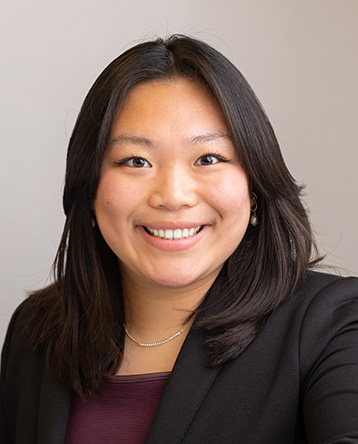Why earn a bachelor's in chemical engineering at Carnegie Mellon?
Cutting-edge, flexible curriculum
Today's chemical engineering challenges often involve analyzing large, complex data sets or modeling complex, multi-step processes. Our industry-informed program equips you to meet these demands. Through your courses, you can:
- evaluate data and develop statistical or machine learning models for predictive analysis
- understand industry-standard software packages
- master programming languages like Python that allow you to analyze data and develop computational models to solve real-world problems
You can tailor your chemical engineering degree with electives. Beginning your third year, select courses in fields that align with your interests, from complex fluids to semiconductors. Build upon these courses to add additional majors and minors to enhance your chemical engineering degree.
Explore the BS in chemical engineering curriculum
Collaborative facilities
Within Doherty Hall, you can apply your knowledge and practice industry tools.
- Undergraduate flexible learning space: A multifunction workspace, lounge area, and meeting room provide an educational workspace as well as a social and community space. A quiet study room with computers offers mathematical modeling and simulation software crucial for chemical engineers.
- Robert Rothfus Laboratory and Lubrizol Analytical Laboratory: Use computerized data acquisition and control systems to develop experimental tests of chemical engineering theory or process design alternatives.
Working together with your classmates, you can enhance your practical skills as you apply theoretical concepts to real-world scenarios.
Hands-on chemical engineering research
CMU considers research a critical part of your bachelor's degree in chemical engineering. Our unique undergraduate research opportunities allow you to team up with professors and graduate students on ground-breaking experiments or theoretical models. Join ongoing faculty projects or test your own hypotheses with guidance from mentors. Your findings may push the boundaries of the field while preparing you for graduate school or a career at the forefront of innovation.
The department's research areas include:
Conference and international opportunities
We want you to gain diverse knowledge and experience during your undergraduate journey. The PPG Chemical Engineering Undergraduate Professional Development Fund enables sophomores, juniors, and seniors to participate in conferences or other professional development opportunities. This allows you to present your research, learn from experts, and establish valuable connections within the field.
Furthermore, you can study abroad via exchange programs specifically created for chemical engineering majors. Collaborate with professionals worldwide and experience the broad applications of the field on a global scale.
CMU's Chemical Engineering department has relationships with top-tier academic institutions across the globe:
Integrated Master's/Bachelor's degree option
Gain a competitive edge by pursuing our Integrated Master's/Bachelor's (IMB) degree program. This accelerated track allows you to earn both a bachelor's and a master's degree in chemical engineering within five years. The IMB program provides advanced training, preparing you for a career in cutting-edge research or pursuing a Ph.D.
Learn more about the accelerated IMB degree
Close-knit, collaborative community
The Department of Chemical Engineering has created a cooperative environment where students team up on projects. In addition, faculty and teaching assistants encourage you to attend office hours and ask questions. You'll learn the technical and interpersonal skills you need to compete and succeed in the workforce.
Our facilities also reflect this collaborative approach. We have adopted an open-plan layout for our laboratories, allowing you to share equipment and ideas freely. Develop the confidence to push boundaries and seek feedback when advancing the field of chemical engineering through our supportive department.
Chemical engineering undergraduate student spotlights
What you learn in the Bachelor of Science in chemical engineering
CMU's bachelor's in chemical engineering program takes four years to complete and aims to produce graduates who can tackle important modern-day problems, such as creating more sustainable plastics and cleaning up groundwater from harmful chemicals.
Through rigorous coursework, hands-on lab experiences, and design projects, you can gain:
- A strong foundation in chemical engineering fundamentals and applications, including principles of thermodynamics, fluid mechanics, and chemical reaction engineering
- An understanding of molecular properties and their influence on chemical processes
- Expertise in process design, manufacturing operations, and optimizing production systems
- Mastery of underlying principles in chemistry and physics
- Computational strategies and advanced modeling techniques
- Proficiency in programming languages like Python
Explore the undergraduate curriculum
Careers and outcomes for chemical engineering majors
Our BS in Chemical Engineering prepares you for immediate career opportunities or further academic pursuits. In recent years, about a third of our graduates have pursued advanced degrees to deepen their studies. The majority of our graduates enter the workforce directly, with many securing positions in biotechnology or scientific and technical consulting firms. Others apply their skills across various industries, including consumer goods, energy, food, and beverage.
Recent students graduating with a bachelor's in chemical engineering found roles at:
- Accenture
- Avery Dennison
- Deloitte
- Merck
- Moderna
- Naval Nuclear Laboratory
- PepsiCo
- Procter & Gamble
Job titles for our BS in chemical engineering graduates include:
- Associate consultant
- Associate engineer
- Process engineer
- Research specialist
- Software engineer
- Tech analyst
Median salary (classes of 2022-2024*): $80,000
*Based on survey results from program graduates
See more post-graduation salaries and destination information for recent CMU chemical engineering undergraduates.
Hear from CMU chemical engineering alums
New admissions policy
Students now apply directly to an engineering major
Students applying to the College of Engineering can choose their major at two times: when applying to a major directly or when applying undecided and making a selection in the spring of their first year.
Students who apply directly to a major are admitted directly to that major. Students admitted as undecided within the College of Engineering are allowed to choose among the primary majors during the spring semester of their first year.
Requests to change majors will be considered after the first year but are not guaranteed to be approved and will be evaluated on a case-by-case basis.
Take the next step
Explore the world of chemical engineering at Carnegie Mellon University, where cutting-edge research, international experiences, and a collaborative environment await you. See how our bachelor's in chemical engineering program equips you with the knowledge, skills, and experiences to make a lasting impact.
Enrollment and graduation statistics
View undergraduate enrollment and graduation data for the Department of Chemical Engineering.
Statement of Assurance
Carnegie Mellon University does not discriminate in admission, employment, or administration of its programs or activities on the basis of race, color, national origin, sex, disability, age, sexual orientation, gender identity, pregnancy or related condition, family status, marital status, parental status, religion, ancestry, veteran status, or genetic information. Furthermore, Carnegie Mellon University does not discriminate and is required not to discriminate in violation of federal, state, or local laws or executive orders.
The university's Discriminatory and Sexual Misconduct Policy contains grievance procedures that provide for the prompt and equitable resolution of Complaints alleging any action which would be prohibited by this Policy.
Inquiries concerning the application of and compliance with this statement should be directed to the Office for Institutional Equity and Title IX, Carnegie Mellon University, 5000 Forbes Avenue, Pittsburgh, PA 15213, telephone 412-268-7125.
Obtain general information about Carnegie Mellon University by calling 412-268-2000.
Carnegie Mellon University publishes an annual campus security and fire safety report describing the university's security, alcohol and drug, sexual assault and fire safety policies, and containing statistics about the number and type of crimes committed on the campus, and the number and cause of fires in campus residence facilities during the preceding three years. You can obtain a copy by contacting the Carnegie Mellon Police Department at 412-268-2323. The annual security and fire safety report also is available online at www.cmu.edu/police/annualreports.
Information regarding the application of Title IX, including to admission and employment decisions, the sexual misconduct grievance procedures and process, including how to file a report or a complaint of sex discrimination, how to file a report of sexual harassment, and how the university responds to such reports is available at www.cmu.edu/title-ix. The Title IX coordinator may be reached at 5000 Forbes Ave., 140 Cyert Hall, Pittsburgh, PA 15213; 412-268-7125; or tix@cmu.edu.
For more information regarding the statement of assurance please visit www.cmu.edu/policies/administrative-and-governance/statement-of-assurance.html.






